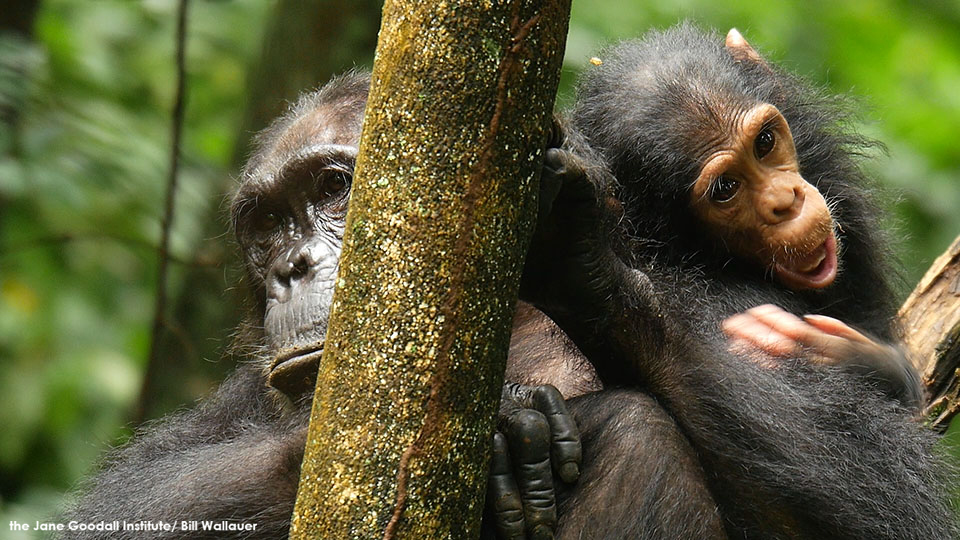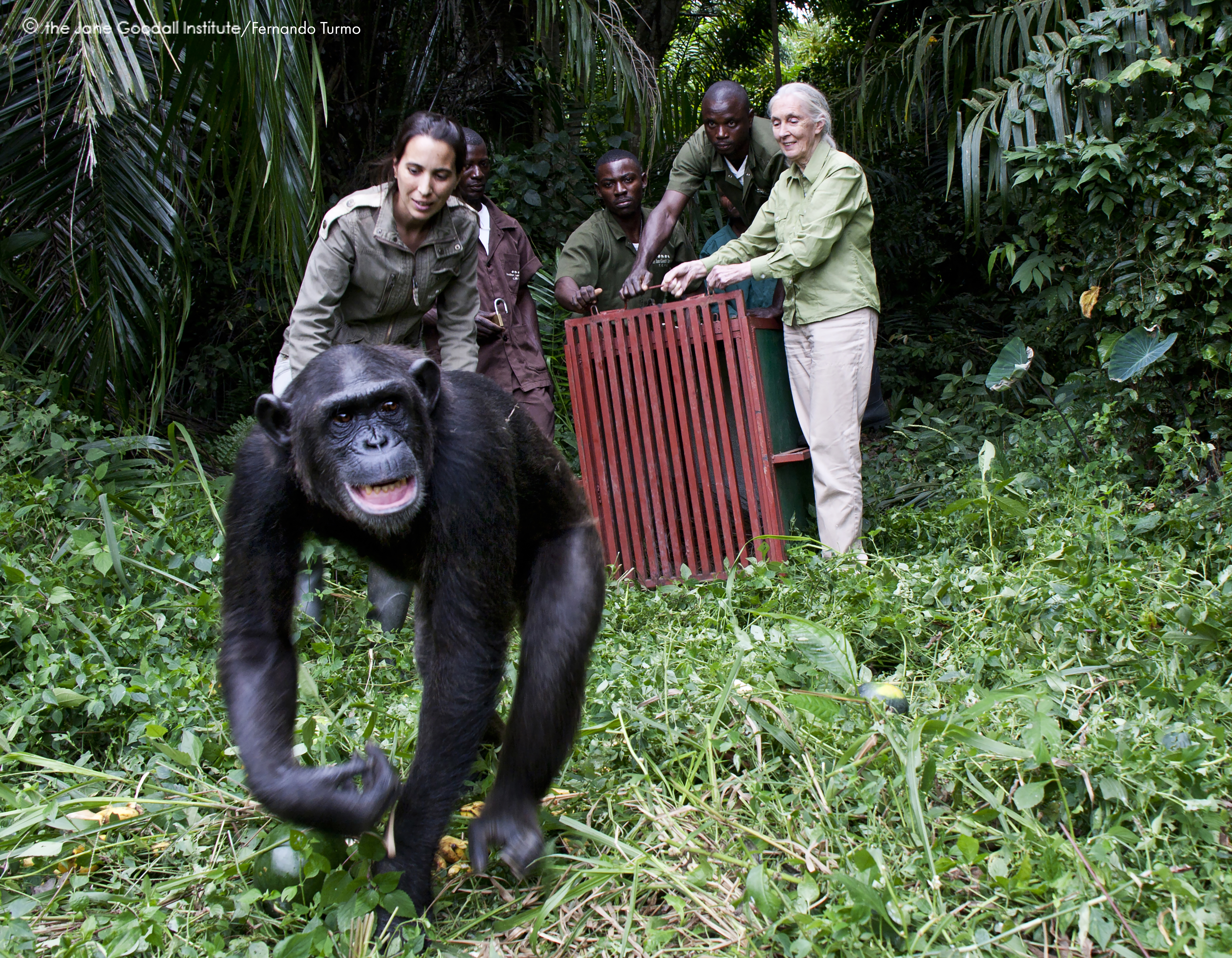In the not-so-distant past, when scientists discussed primate behavior, they often outright denied the existence of the many complex emotions that these intelligent animals possess. It is only recently that humanity has discovered that, like us, great apes have a rich inner world and nuanced social structure (primarily thanks to the research of Dr. Jane Goodall!). While we are grateful for the outstanding research of Dr. Goodall, we’re also extremely grateful for the work of all those who have continued to study chimpanzees and other great apes, research that has revealed stunning insights including….that chimpanzees can likely show gratitude, too!
Sharing is Caring
Gratitude is one of the emotions/concepts that is typically only ascribed only to humans. However, decades of observations of great ape behavior at Gombe (and in other regions of the chimpanzee range) have shown us that it’s very likely that chimpanzees have the ability to feel and display gratitude.
In Gombe, food sharing has been studied among several groups, and largely the “sharing under pressure” hypothesis is supported. This means as “beggars” insist upon food, sharing occurs at a higher rate under this pressure. Though that hypothesis has been deemed more likely, there is also a possibility that food sharing happens because the “possessor relinquishes food in exchange for past or future sharing or for items of a different currency (e.g. grooming, alliances or copulations)”. In other words, THANKS!
 In another recent study of wild chimpanzees, the researchers studied the way chimpanzees choose to reciprocate the action of being groomed by another chimpanzee. Their findings show that chimpanzees who have been groomed are often likely to reciprocate by in turn offering a grooming session of their own. This occurs even when the chimpanzee being groomed is of a higher social rank than the other.
In another recent study of wild chimpanzees, the researchers studied the way chimpanzees choose to reciprocate the action of being groomed by another chimpanzee. Their findings show that chimpanzees who have been groomed are often likely to reciprocate by in turn offering a grooming session of their own. This occurs even when the chimpanzee being groomed is of a higher social rank than the other.
Is this an example of gratitude? It may be, or it may be very literally a case of “I’ll scratch your back, you scratch mine”, where the groomers are planning on a future payoff from the other chimp. Either way, this practice provides a fascinating insight on what could be the building blocks for the traits of altruism and gratitude humans and chimpanzees have perhaps inherited from a common ancestor.
A Life Saving Thank You
In a less scientific instance, a striking example was experienced by our own Dr. Rebeca Atencia demonstrating what one might say shows the depth of gratitude chimpanzees can display. Several years ago, before Dr. Atencia was executive director of JGI in the Republic of Congo and head veterinarian/manager at Tchimpounga, she was treating an injured alpha chimpanzee named Kutu (he had been in a dispute with others in the group). By secretly gesturing to the chimp (to avoid a hostile dynamic with the others), Rebeca would encourage Kutu to come to her so she could treat his serious wounds. After around 10 days, he was in much better shape and Dr. Atencia was satisfied with his recovery.

Dr. Jane Goodall and Dr. Rebeca Atencia release orphan chimpanzee Wounda onto JGI’s Tchimpounga sanctuary island of Tchindzoulou
Six months later, while on a walk in that same forested area to research the plants that were a part of the chimpanzees’ diet, Rebeca began tapping on a tree noted for large, delicious fruit very popular with chimps and other wildlife. By happenstance, in that same area a large male chimpanzee was displaying for females by tapping loudly on trees. Not realizing this and still facing the tree, Rebeca heard a low guttural chimpanzee call coming from right behind her – one of aggression. The chimpanzee jumped on Rebeca and she suffered an immediate gash to the head, with a great deal of bleeding. Rebeca was alone in the forest and was sure she was going to be killed.
After Rebeca threw the chimp from her, he began making a call to summon the others in the group to hunt – she was the target. When the other chimps arrived, they began to make the call as well, until one chimpanzee in front saw Rebeca and immediately instead turned to the male chimp that had first attacked her. He turned the call toward this male, and the others in the group began to bite and attack the chimpanzee who had originally called for “the hunt”. The new male, who had shifted the attack, put his body between Rebeca and the original male. When the chimp protecting her turned to face Rebeca, she recognized his eyes.
It was Kutu.
This was her signal to run, her one chance to get away and Kutu gave it to her. On that day, she decided to name her first child Kutu, and she did – her son’s name is Kutu. Rebeca believes that the incident was an example of the connection she was able to make with this very heroic chimpanzee, and the possibilities of our nonverbal connections to other sentient animals. Though this is in no way a true study on the nature of chimpanzee gratitude, it is certainly another reminder that there is so much more we have left to learn from our closest living relatives.
Who knows what else we share with these amazing beings?
Watch Rebeca’s full story here. You can support ongoing research at Gombe by donating today!

The Jane Goodall Institute is a global community conservation organization that advances the vision and work of Dr. Jane Goodall. By protecting chimpanzees and inspiring people to conserve the natural world we all share, we improve the lives of people, animals and the environment. Everything is connected—everyone can make a difference.









